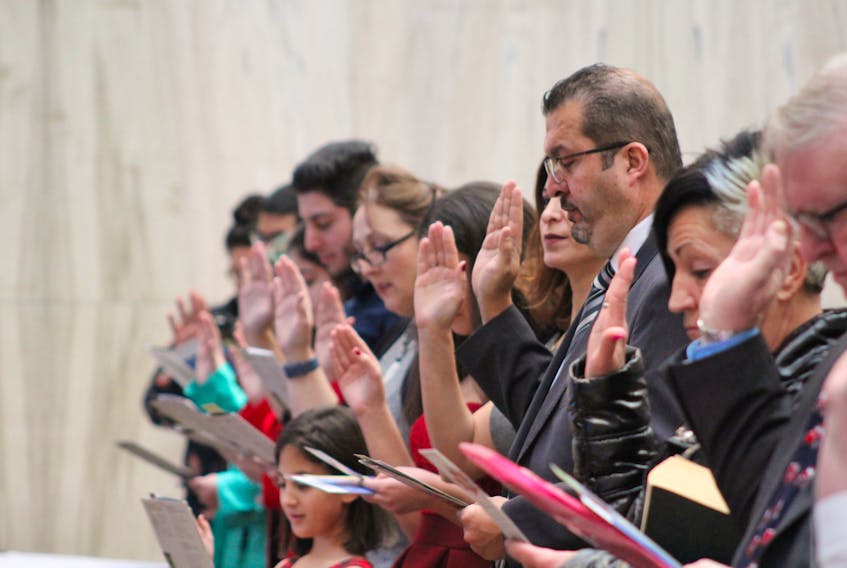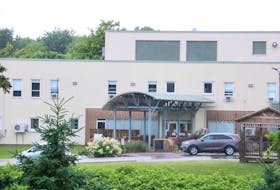A public forum entitled “Welcoming Refugees… Do we?” was held at the Murchison Centre in Charlottetown in November. Mary Jo Leddy, well-known advocate for refugees in Toronto was our guest speaker. The forum included small group discussions with approximately 75 participants. We wish to share Island participants’ thoughts and ideas regarding their encounters with newcomers.
Many Islanders have observed that our communities have become more diversified recently, thanks to the arrival of newcomers from different countries and cultures. Some came to us as refugees, fleeing persecution and/or civil strife in their former homelands. Others arrived here to explore business opportunities.
Regardless of the reason for their arrival, our keynote speaker emphasized that what makes the greatest difference to newcomers is the warmth of the welcome. If newcomers feel sincerely welcomed, then their successful integration into our local culture and society is greatly enhanced. How does this occur? What does an authentic warm welcome look like?
Several groups advanced suggestions to welcome newcomers: a) Invite newcomers (that is, former refugees) into our home to share a meal; b) Invite a newcomer to join us for coffee; c) Offer to help newcomers improve their English language skills by conversing together regularly; d) Introduce newcomers and their children to community opportunities such as the public library, Kidsport, Beavers, 4-H clubs; and e) Invite a newcomer to join a group doing a hobby together.
These were just some ideas for extending a warm welcome and engaging with newcomers.
Some discussion groups advocated that our engagement with newcomers need not be just us helping them. It is also beneficial to invite newcomers to get involved in helping others.
One participant indicated that she often asked newcomers to help her, for example, by driving her to a doctor’s appointment. This allowed the newcomers to reciprocate and help others, thus building mutual trust.
Others have invited newcomers to volunteer with them in local community activities—serving at community socials or participating in neighbourhood cleanups at a local playground. Reaching out in this way has given Islanders an opportunity to share our culture with others. Ultimately, this supports newcomers in developing an understanding of our culture. Equally, such involvement allows us to gain an appreciation of newcomers’ culture.
One group explored several myths about refugees or newcomers. Participants investigated the common misunderstanding that newcomers get special treatment and receive benefits that perhaps Islanders do not receive.
The discussions revealed that this was not the case. A surprising reality came to light: the Government of Canada expects refugees to repay their travel costs. Costs to transport family members from a global trouble spot to Canada can amount to thousands of dollars.
After only a year or two, refugees are expected to start repaying their “travel loan” on a monthly basis.
Another comment shared was most newcomers want to work and earn their living. Members of a refugee family frequently take on minimum wage jobs to provide for themselves and their family. Other newcomers with some resources and entrepreneurial experience have established their own businesses; in doing so, they have provided an income for themselves, and have created employment opportunities for others.
An overwhelming consensus of the group discussions was that Islanders and newcomers have much to learn from each other. There is no doubt that newcomers need our assistance and support to become contributing members of our local communities and ultimately Canadian citizens.
However, it is also apparent that as we become involved with newcomers, we also benefit as we learn from their experiences, ideas, and approaches. By engaging with each other our mutual understandings are enhanced and our lives are enriched.
The need for sponsoring refugees has never been greater, with ever-growing numbers of displaced persons due to war, political strife, religious persecution. Canada has a well-established reputation for welcoming newcomers.
Islanders for many years have clearly shown their willingness to do the same: to open their homes and their hearts to newcomers from all over the world. If you are interested in receiving more details about the Forum discussions, please contact the undersigned.
Gerald Gabriel and Martha Gabriel are members of the public forum planning committee.









